In today’s high-speed commercial sphere, customer service holds the key to shaping the trajectory of any organization. As companies diligently work towards boosting digital experiences, innovative strategies to optimize support processes have become paramount. Among these tactics, the implementation of FAQ chatbots stands out as a particularly effective and affordable tool. These intelligent interfaces are purpose-built to facilitate quick responses to frequently asked questions. They offer prompt and precise advice, all while significantly conserving valuable time and resources.

In this context, it’s interesting to note that 72% of consumers express a preference for independently resolving their issues, bypassing the need to engage customer support agents. Remarkably, dynamic FAQ solutions have the capacity to automate as much as 50% of inquiries, resulting in substantial reductions in call, chat, or email load on contact centers. A striking 44% of brands have already embraced knowledge bases or FAQ systems on their websites. These statistics underscore the growing recognition of the foundational role that such bots can play in redefining client care landscapes.
As we take a closer look at the realm of FAQ chatbots, let’s explore how these smart assistants are utilized to simplify interactions, simplify support operations, and drive overall business success. We’ll also share actionable insights for flawless integration.
Table of Contents
Concept of FAQ Chatbots
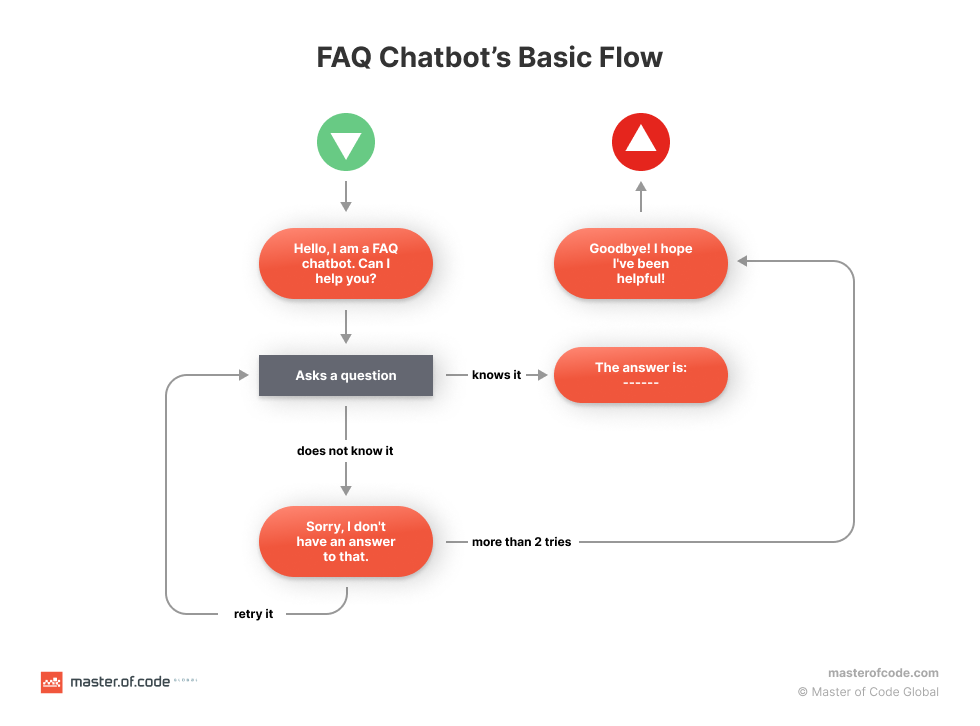
Frequently Asked Questions chatbots, also known as Q&A chatbots, are automated virtual assistants designed to interact with users and provide responses to common inquiries. These agents use a conversational interface, supporting client queries in natural language and receiving instant replies. Traditional static pages require people to manually search through lists of articles and find needed data. The AI FAQ chatbot, on the contrary, suggests a more dynamic and user-centric approach to addressing top-searched cases.
The primary function of such implementations is to analyze the input, interpret the intent behind the question, and generate relevant feedback. By utilizing technologies like natural language processing (NLP) and machine learning (ML), these bots can understand keywords, language complexities, and context. Such capabilities allow them to retrieve accurate facts from a predefined knowledge base. This information repository comprises a collection of commonly asked questions and their corresponding answers. It covers various topics such as product details, services, troubleshooting steps, and more.
The basic chatbot caters to users seeking rapid assistance, enabling them to obtain the insights they need without navigating through extensive website sections. The real-time nature of these FAQ-based chatbots provides an immediate resolution to shared problems, contributing to enhanced satisfaction and a streamlined digital experience. Overall, these systems serve as efficient tools to offer quick and precise explanations. They optimize customer support processes and facilitate self-service for inquirers.
Why Should You Implement AI Chatbots to Replace Traditional FAQs?
While FAQ pages have traditionally served as a primary source of information for customers, companies are increasingly recognizing the limitations of this static approach. Long lists of questions can be tedious to navigate. Moreover, users may struggle to find the specific answers they require. This leads to frustration and ultimately discourage visitors from seeking self-service support.
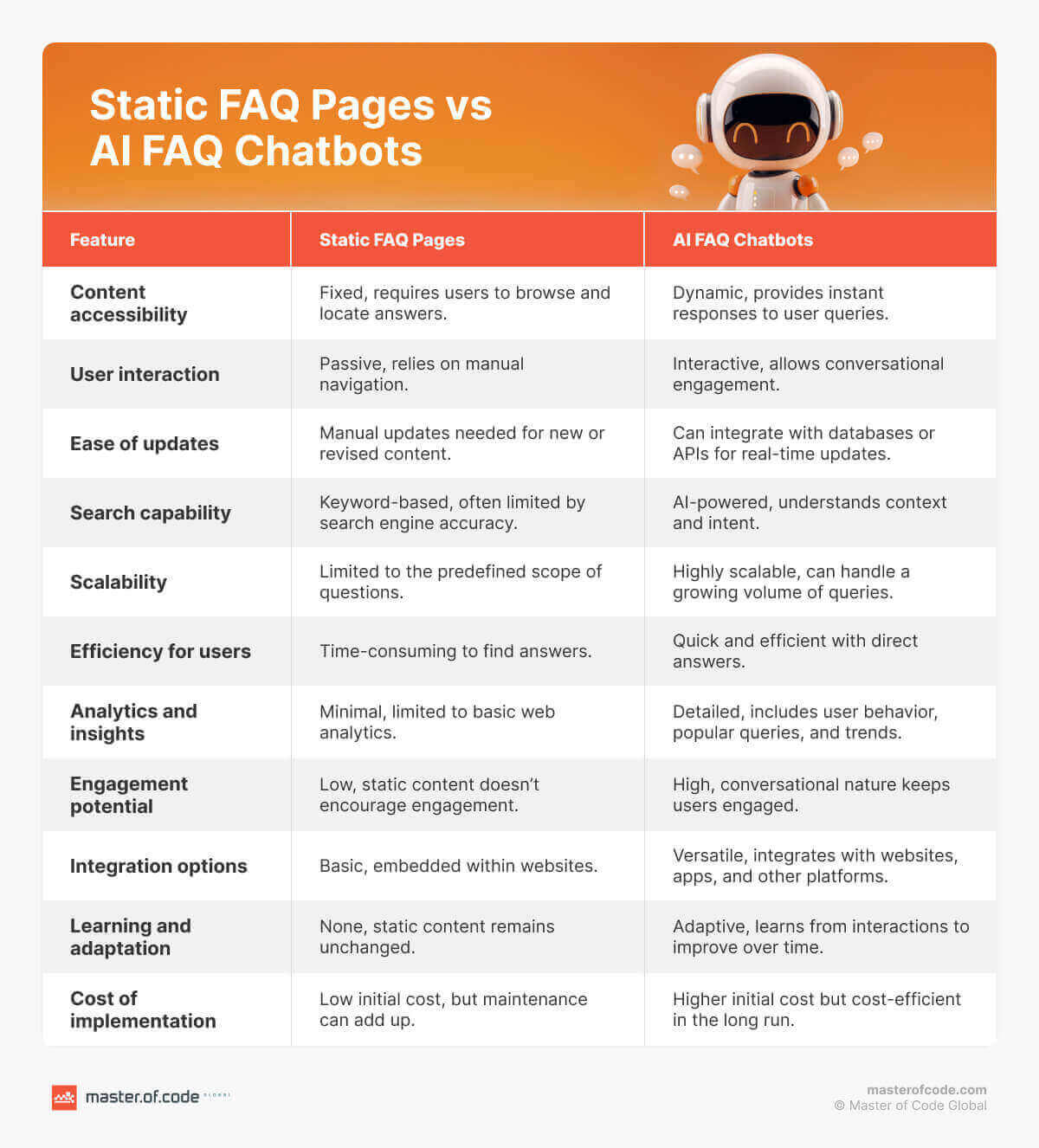
So why should you adopt AI assistants instead of FAQs? An AI-powered conversational interface is a more dynamic and engaging alternative, simulating a dialogue with the client to provide a more tailored experience. Firms that implement AI-based chatbots to answer FAQs can benefit from boosted customer satisfaction and improved operational efficiency. By incorporating NLP, these bots understand the intent and context of user queries, sending factual and personalized explanations in real-time. This flexible method guarantees swift replies to inquiries, boosting convenience and improving brand perception.
Moreover, AI FAQ chatbots offer 24/7 availability, providing instant guidance even outside of business hours. This round-the-clock presence ensures that consumers get the info they need, whenever they need it, leading to increased engagement and loyalty. By automating responses, businesses optimize their resources and ensure a consistent and accurate flow of data.
Advantages of Implementing FAQ Chatbots
Q&A chatbots are a cost-effective and efficient way to improve customer service, as they can reduce the workload on your support team and provide 24/7 assistance. In addition, they help to drive trust and personalization, boost sales, and increase brand awareness.
Here are some of the benefits of AI FAQ chatbots:
- Cost and effort optimization. Such bots can be a budget-friendly method to cut down business costs and the operational load on your managers. Tech companies design and build custom solutions tailored to your unique needs, guaranteeing frictionless integration with the existing ecosystem. Such automation streamlines interactions, saving both time and effort. Overall, virtual assistants effectively decrease customer service expenditures by as much as 30%, efficiently managing most routine inquiries.
- Faster response time. FAQ chatbots aid with providing rapid answers within seconds. They are available 24/7, ensuring clients receive timely assistance. This feature aligns with the preferences of consumers, as 74% prefer to utilize bots for their swiftness.
- Multilingual support. Conversational agents can be programmed to communicate in multiple languages, expanding your client base and improving accessibility. It’s particularly advantageous for businesses catering to diverse markets, as it enables seamless interactions for customers in various linguistic regions.
- Higher response rate. Automation powers remarkable reply performance. Instant gratification, a hallmark of chatbot conversations, elevates your reputation. Moreover, these applications prevent users from navigating away to other pages, keeping them engaged and satisfied.
- Enhanced user experience. Chatbots for FAQs offer a conversational landing page experience that guides visitors to vital info smoothly. With multi-language capabilities, on-the-spot feedback, and readily accessible information, they raise satisfaction rates. This ease of use minimizes frustration, refining every touchpoint with your brand.
In a world where immediate responses and exceptional experiences are paramount, FAQ chatbots emerge as indispensable tools that optimize operations, elevate revenue, and foster stronger relationships.
Different Types of Q&A Chatbots
FAQ chatbots come in various types, each built with different technologies and approaches to address user queries. Understanding these distinctions helps businesses choose the most suitable solution for their exact needs. Here are three common kinds:
- Conversational AI or Natural Language Processing chatbots. These virtual assistants rely on NLP and ML to understand the complexities of human language and facilitate intuitive, lifelike dialogues. They analyze submitted requests, interpret context, and generate human-like responses. A key advantage is their ability to learn from each exchange, continuously improving their comprehension and performance over time. They excel at handling complicated use cases and offering a more individualized client experience.
- LLM-powered chatbots. This category represents the latest advancement in Conversational AI, employing large language models trained on massive datasets of text and code. These systems empower bots to engage in highly sophisticated conversations, write creative text formats, translate languages, and provide insightful replies to complex questions. Such functions extend their utility beyond serving as a quick-help guide. Bots become capable of generating diverse content, offering personalized recommendations, and even assisting with tasks like coding or data analysis.
- Rule-based chatbots. Operating on a foundation of predefined rules, these agents respond to specific keywords or patterns identified in the input. Essentially, they follow a rigid decision-tree structure, which limits their capacity to comprehend nuanced communication or evolve from interactions. This makes them best suited for straightforward FAQs with simple, predictable answers.
In conclusion, each type of Q&A chatbot offers unique advantages and capabilities. By acknowledging the strengths and limitations of each conversational tool, companies can make informed decisions on the most appropriate technology for their customer support requirements.
Key Considerations Before Integrating an AI FAQ Chatbot
Before incorporating such AI bots into your service, there are crucial aspects to evaluate that can greatly influence its success. These considerations will provide direction for decision-making, ensuring the integration aligns with your organizational priorities and customer-focused outcomes.
Factors to take into account before introducing an FAQ automation chatbot:
- Business goals & capabilities. The decision to implement a virtual assistant should be deeply rooted in your objectives. Determine if the solution will primarily automate routine tasks for your support team or focus on enabling an enhanced customer journey. Carefully weigh the price points of various tools against the benefits they offer, and let a detailed comparison guide your choice.
- Industry relevance. Industries differ significantly in their client care demands and challenges. Identify your specific niche requirements to tailor the agent’s functionality accordingly. For instance, an eCommerce website’s FAQ chatbot should adeptly address product inquiries, delivery concerns, and complaints to elevate the shopper’s experience.
- Chatbot cost. While pricing models vary, the value proposition of an AI agent often outweighs the upfront expenses. Analyze the potential return on investment (ROI) by considering how this tool can optimize efficiency, reduce expenditures, and boost satisfaction metrics. Research different pricing models offered by potential providers, such as hourly rates or project-based fees.
- FAQ database complexity. The size and intricacy of your knowledge base play a pivotal role in selecting a suitable chatbot provider. NLP chatbots excel at human-like interactions but demand substantial training data. In contrast, rule-based bots are easier to manage and thrive with smaller databases.
- Integration channels. Verify that your tech partners will smoothly integrate with your existing channels and messengers. Omnichannel capability guarantees your chatbot is accessible to clients on platforms in use, preventing gaps. Prioritize providers offering third-party integrations for the media you utilize to preserve a cohesive user interface.
- Communication capabilities. Ensure your AI FAQ chatbot understands and maintains context throughout a conversation, even if a user rephrases questions or switches topics. This allows you to keep responses accurate and relevant. For businesses operating in diverse markets, multilingual help is essential. A solution capable of communicating in multiple languages broadens your audience and improves accessibility.
By thoroughly evaluating these factors, you can choose wisely when integrating an FAQ chatbot into your processes. This strategic approach will enrich consumer interactions, streamline support operations, and contribute to overall company growth.
Real-World AI FAQ Chabot Use Cases
The applications of this technology span various domains, catering to both customers and employees. These intelligent conversational agents play a paramount role in enhancing operational efficiency and user experiences across different scenarios.
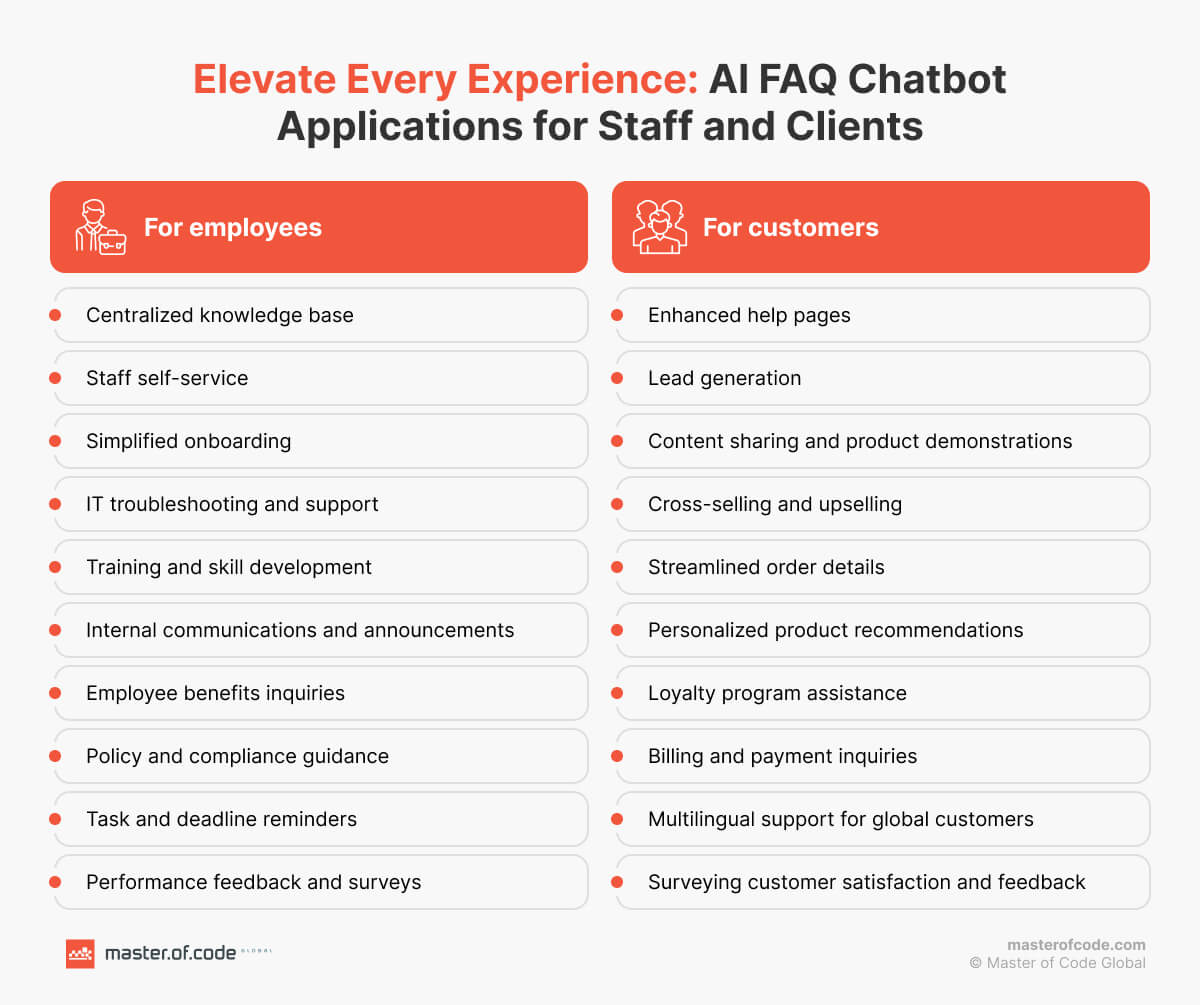
Employee FAQ Chatbot Use Cases
These digital aides demonstrate the capacity to optimize overall performance and empower staff across a range of duties:
- Centralized knowledge base. Conversational systems serve as an all-in-one data hub for employees, empowering rapid and effortless entry to databases scattered across different departments and platforms. This includes HR policies, IT documentation, product descriptions, and more. By consolidating info in one easily accessible location, AI bots improve productivity and reduce time spent searching for answers.
- Staff self-service. Chatbots for internal employees provide them with instant access to essential information such as working hours, meeting schedules, and company policies. FAQ chatbots also assist with software downloads or updates and address common IT-related questions, reducing the burden on internal support teams.
- Streamlined onboarding. These tools are invaluable during employee onboarding. They efficiently disseminate knowledge about organizational culture, guidelines, procedures, and other functional aspects, helping new hires acclimate to their roles more quickly and effectively.
- Reduced customer service load. By incorporating AI FAQ chatbots on business websites, client inquiries are resolved swiftly without overwhelming managers. This approach optimizes workforce allocation, enabling human agents to focus on more complex tasks while virtual assistants handle routine queries.
Use Cases for Customers
Redefining customer support, FAQ chatbots offer round-the-clock assistance, quickly adapting to various question formats, and ensuring the accuracy and relevance of answers. As we explore their versatile applications, their fundamental role in raising loyalty and decreasing churn becomes evident:
- Enhanced help pages. They operate 24/7 and present immediate responses to client challenges. Incorporating them into the existing ecosystem on websites enhances the touchpoints as AI enables recognizing different inquiry formats, catering to urgent searches, and updating the knowledge base.
- Lead generation. AI FAQ chatbots analyze and identify consumer needs through their input and behaviors. During communication, these systems gather contact info, forwarding it to the marketing department for personalized follow-up, nurturing leads, and increasing the chances of conversion.
- Cross-selling. Despite their primary focus on answering queries, Conversational AI solutions for customer service tailor engagement as per previous interactions and subtly advertise appropriate products or services. By directing users towards additional offerings, chat assistants contribute to cross-selling and revenue growth.
- Streamlined order details. Buyers seeking order-related information can also benefit from AI bots, which swiftly retrieve and share applicable data. If users require more exhaustive aid or wish to cancel an order, the FAQ chatbots can seamlessly transition to a human support agent.
- Content sharing. These tools also build stronger and more long-lasting relationships by disseminating tailored materials such as blogs, articles, and videos based on user behavior and keywords. Furthermore, artificial intelligence facilitates product demonstrations, guiding shoppers through the usage process and sharpening their product awareness.
From enhancing client care to encouraging lead acquisition and promoting product bundling, AI FAQ chatbots revolutionize how businesses engage with both consumers and employees. These adaptable virtual assistants drive agility across teams, deliver measurable improvements in productivity and resource management, as well as accelerate response times and service delivery.
FAQ Chatbot Examples
Winnipeg 311 Chatbot
Master of Code Global partnered with the City of Winnipeg to launch a Messenger-based bot that eases the load on the 311 call center. Citizens can now plan trips, get real-time bus updates, and access non-urgent city services on demand. The chatbot uses natural language processing to understand queries and connects to live agents for more complex requests, delivering 24/7 support and a more accessible, user-friendly experience.
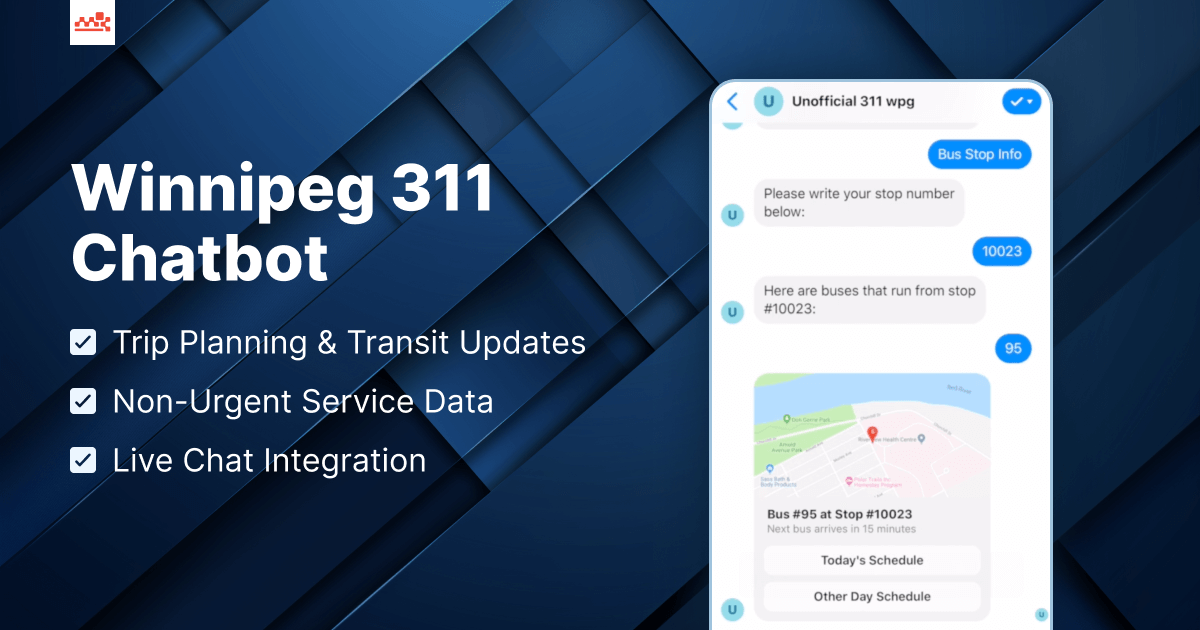
La Mer Chatbot
To bring its luxury in-store service online, La Mer sought help from our company to develop a Messenger chatbot that delivers personalized skincare advice. Through a “Find My Regimen” quiz and conversational product exploration, the bot recommends tailored routines and ingredients based on user concerns. It also shares the brand’s story and locates nearby stores, blending education, product discovery, and premium assistance into one seamless digital journey.
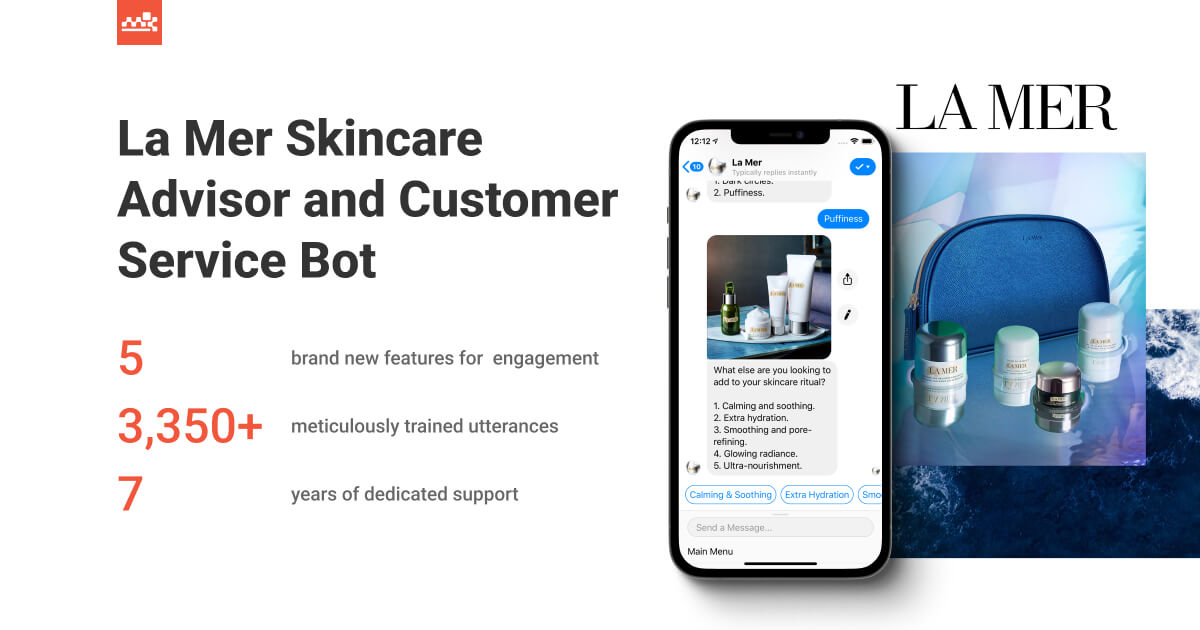
Burberry Chatbot
To elevate the customer experience, Burberry integrated an AI-powered concierge that blends eCommerce with storytelling. The assistant offers curated suggestions, gifting aid, and direct runway shopping. Users can explore live fashion shows, receive targeted updates, and dive into the brand’s heritage through interactive narratives. With a smooth handoff mechanism, the solution facilitates truly luxury shopping that feels individualized, immersive, and always on.

Generative AI Slack Chatbot
This application was designed to streamline access to organizational knowledge for a technology product company. Employees can instantly gain answers to questions about products, services, HR, and more – without digging through outdated documentation or messaging multiple teammates. The system also includes an orchestration layer to manage domain-specific requests, improving productivity and collaboration across teams.
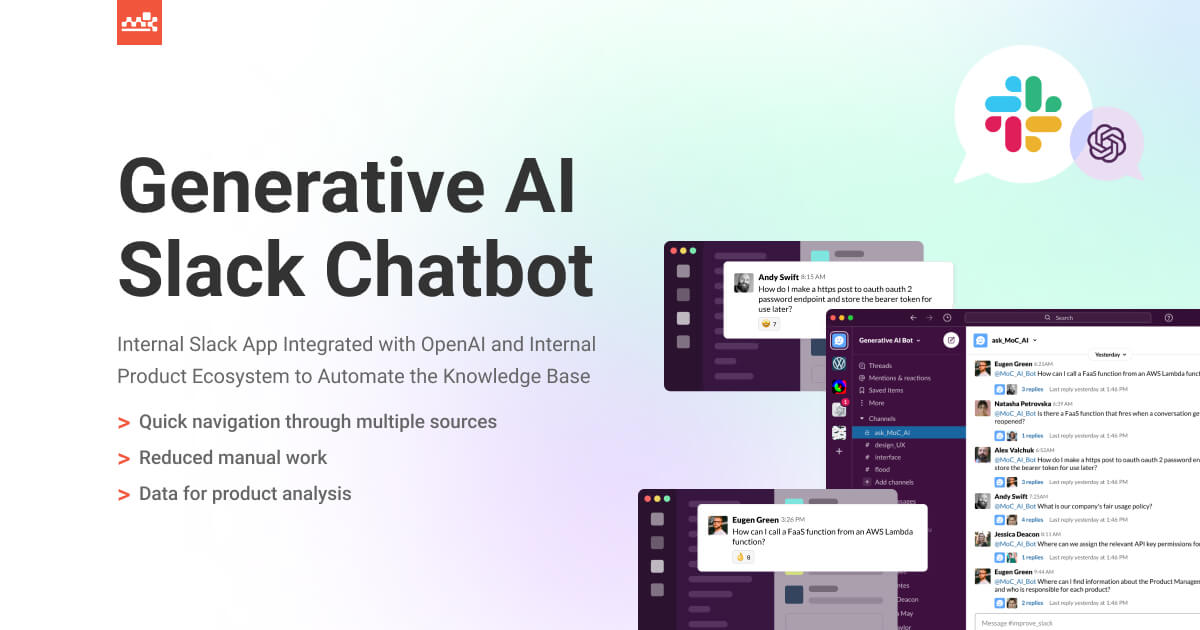
World Surf League Bot
One of the notable examples of AI-based solutions for frequently asked questions is the World Surf League Bot from Master of Code Global. Designed for surfers on Facebook Messenger, this interactive FAQ chatbot offered event notifications, personalized digests, and engaging games. With over 4,000 active users in a week and a 19.6% user retention rate, the bot stood out for its attractive features and timely updates.
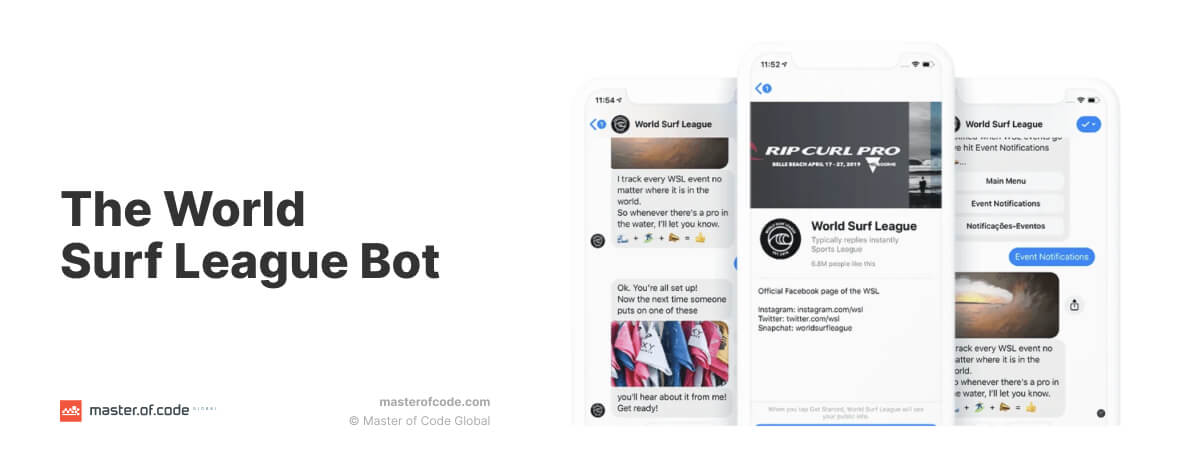
Telecom Virtual Assistant
Facing a surge in inquiries, a leading telecommunications company partnered with Master of Code to develop a virtual assistant capable of handling a wide range of FAQs and enabling self-service transactions. This allowed customers to resolve many of their questions without human intervention, with containment rates for various support experiences ranging from 62% to 73%. With over 1.1 million conversations engaged, the assistant has significantly improved the client journey while optimizing the operations for the telecom provider.
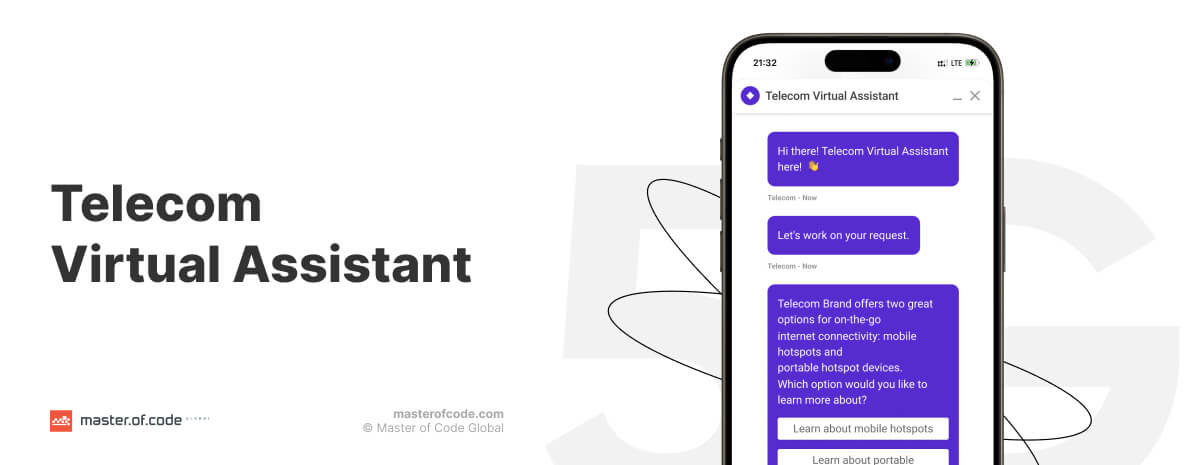
H&M’s Chatbot
H&M’s FAQ Chatbot provides consumers with personalized guidance and rapid responses to inquiries related to their products and services. By utilizing keyword recognition, the bot suggests pertinent topics, helping users address their concerns, and elevating the overall customer experience and engagement. The chatbot offers 24/7 aid for quick solutions to frequently asked questions.
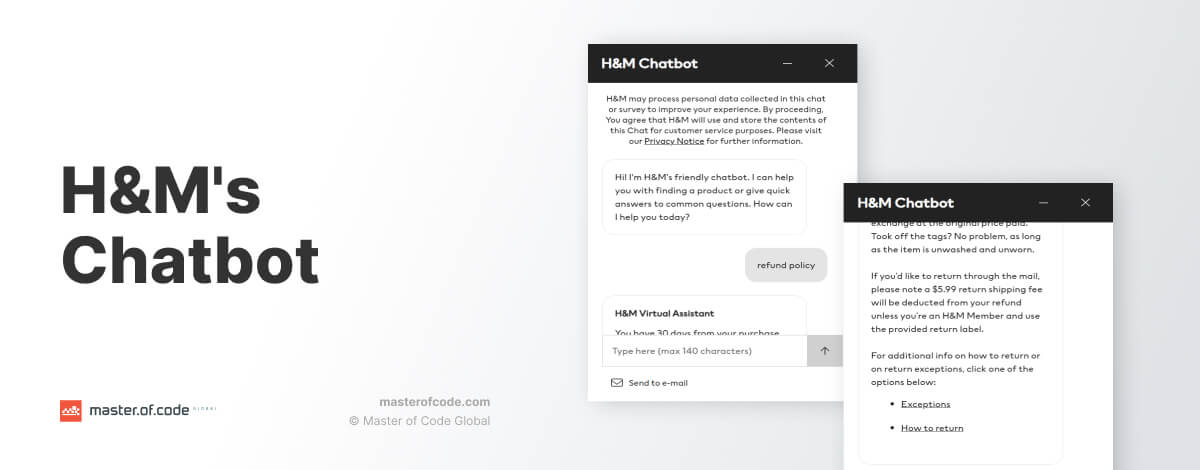
Skylar Chatbot
Skylar, an adaptable FAQ chatbot by Major Tom, is a prime illustration of enhancing communication strategy and enriching user experiences. Serving as the primary digital assistant, Skylar efficiently handles common queries and directs users to the desired information. With Skylar in action, the brand ensures impeccable customer support, providing exceptional marketing solutions through each interaction.
Hertz Chatbot
Hertz Sweden’s AI-fueled bot has revolutionized client interactions by offering tailored responses and personalized messages to website visitors. Beyond addressing typical issues, it actively engages users with customized content, optimizing engagement, and driving sales growth. The implementation of an FAQ chatbot on their website led to a remarkable 23% increase in total revenue. This success underscores the potential of AI-driven applications in advancing customer service quality and boosting business outcomes.
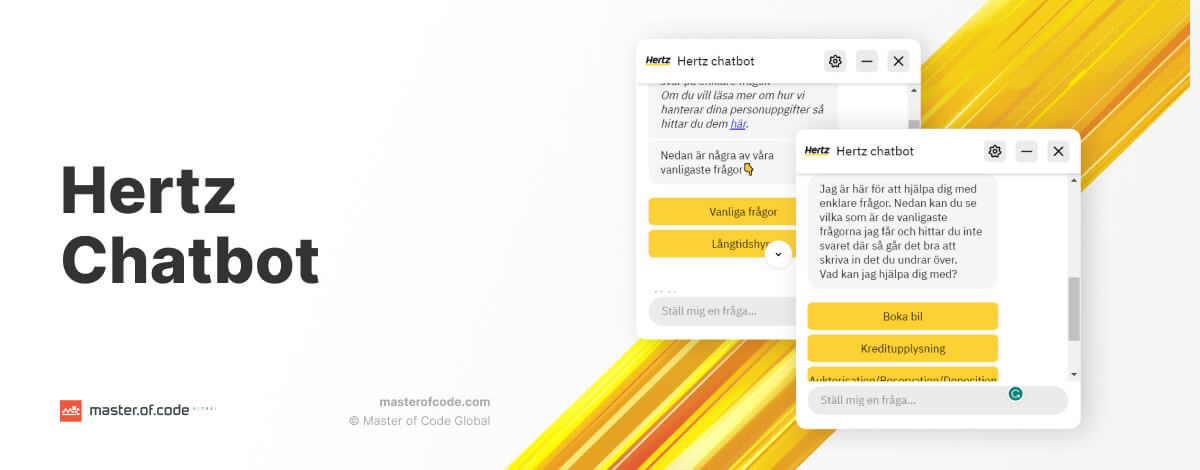
Norwegian Airlines’ Chatbot
By adopting AI chatbots, Norwegian Airlines streamlines client care workflows, ensuring their operations are more efficient and responsive. This digital agent offers 24/7 assistance for flight-related searches, reservations, and travel information. It ensures swift and accurate replies, allowing customers to easily check in for flights and modify bookings. The tool enabled the team to automate 20% of incoming support inquiries effectively. On the whole, the chatbot increases efficiency, reduces costs, and extends service availability, ultimately intensifying consumer satisfaction.
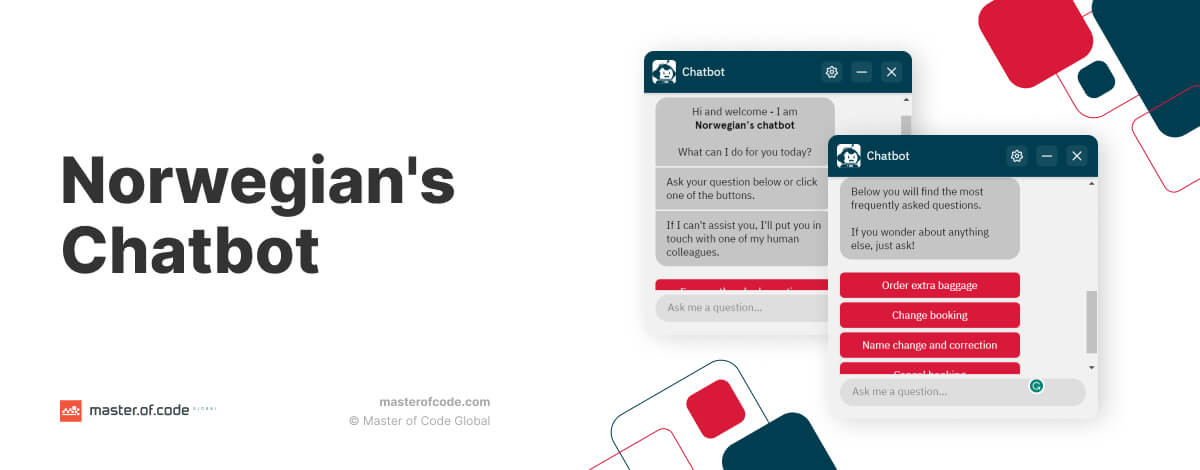
AI Agent Development Approaches: How to Build FAQ Chatbot
At Master of Code Global, we excel at building custom AI solutions from scratch, perfectly tailored to your unique needs. However, we also believe in empowering our clients with knowledge about existing options and best practices. So, before diving into our processes, let’s explore various paths to conversational assistant creation to help you make informed decisions.
Developing FAQ Chatbots with Chatbot Platforms
Chatbot platforms provide pre-built templates and tools that streamline the bot development process. This approach is particularly appealing for businesses seeking a quick and budget-friendly option. With ready-made components, the vendor enables rapid deployment, allowing you to have a functional solution up and running in a shorter timeframe. Moreover, some platforms are designed to be user-friendly, catering to non-technical users who want to create basic FAQ chatbots without delving into coding complexities.
However, there are limitations to using this type of provider. You might find themselves restricted by the generic nature of off-the-shelf applications. Customization options can be limited, potentially leading to conversational agents that lack a unique and tailored touch. Additionally, the AI capabilities provided by chatbot platforms might not be as advanced as those achievable through professional-grade customized engineering.
Hiring Professional Chatbot Development Services
Engaging bespoke chatbot development services offers numerous benefits. These services are provided by experts in AI, NLP, and conversational design who possess in-depth knowledge of the latest industry trends and technologies. This ensures that your AI FAQ chatbot will be built using best practices and up-to-date techniques, resulting in a more effective and efficient solution.
Outsourcing to professionals saves time and eliminates the need to allocate internal resources for development and maintenance. This can be especially advantageous if your team lacks the expertise required for chatbot development. Professional services typically offer faster deployment and greater scalability, allowing you to focus on your central business activities while the specialists handle your bot’s technical aspects.
Choosing the Right Path
Weighing options between in-house development or professional services involves evaluating your organization’s budget, proficiency, and long-term goals. If you have a skilled team and want maximum control over customization, the in-house strategy might be suitable. On the other hand, if you seek efficiency, niche specialization, and adaptability, building custom-made chatbots from the ground up is the right fit for your situation. Balancing your specific needs and resources will guide you toward the optimal approach for your AI FAQ chatbot’s creation.
Developing Your AI-Enhanced FAQ Chatbot with Master of Code Global
When initiating the process of integrating a virtual agent, selecting the right professional service provider is crucial. The development cycle for chatbots comprises a series of strategic steps to ensure the solution aligns with the business’s goals and delivers optimal performance. At Master of Code Global, we specialize in fully customized chatbot development services and Conversational AI applications, tailored from scratch for each client. We don’t offer ready-to-use solutions; instead, we create unique, fully personalized tools to streamline processes, enhance communication, and improve customer engagement.
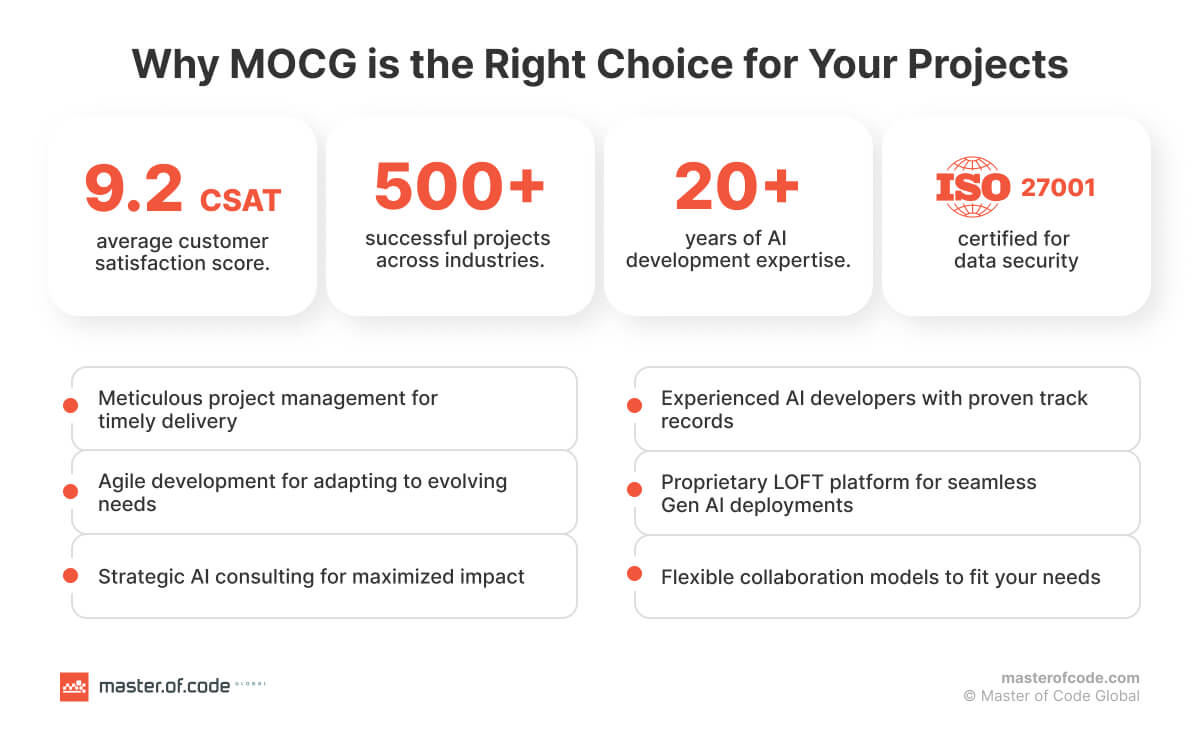
Our approach to custom FAQ chatbot development involves meticulous phases:
- Understand business needs & project specifications. We begin by gaining a deep understanding of the client’s objectives, requirements, and target audience. This helps us align the FAQ chatbot’s functionalities with the company’s branding and aims.
- Analyze user transcripts and data points. Scrutinizing existing interactions and datasets enables us to uncover insights that shape the communication capabilities of the solution and customer digital journey.
- Review and align bot persona. We define an assistant’s personality that is in sync with the brand’s tone and values, ensuring a consistent and relatable user experience.
- AI design analysis and development. Our experts prepare the AI architecture, choosing the right technologies and frameworks to build a robust and efficient application, with a focus on crafting engaging and natural dialogues through conversation design.
- AI training, tuning, and testing. We train the AI agent using ML algorithms, calibrating its responses, and improving accuracy through iterative validation.
- Post-launch AI performance monitoring and enhancement. Even after deployment, our team continues to monitor the FAQ chatbot’s output and refine its capabilities for ongoing optimization, confirming interactions are user-friendly and aligned with your brand’s voice. With advanced AI abilities, our solutions comprehend consumers’ intent, retain context, and provide accurate answers, effectively addressing complex queries and reducing customer effort.
In the end, with expertise in conversation design, cutting-edge AI technologies, and customized solutions from Master of Code Global, businesses will be able to heighten engagement, optimize operations, and facilitate further expansion. Why settle for off-the-shelf implementations when you can have a tailor-made FAQ chatbot that perfectly matches all your parameters? Let’s create something extraordinary together. Contact us today for a free consultation and take the first step toward redefining your customer experience. to enhance customer engagement, optimize operations, and facilitate business growth.
Ready to build your own Conversational AI solution? Let’s chat!
FAQs
How do I connect an AI digital assistant to my company’s FAQ system?
Integration typically involves connecting the bot to your knowledge base through APIs, then indexing the content in a hybrid search engine (combining keyword and semantic search). The AI uses natural language processing to interpret user intent, retrieve the most relevant entries, and deliver them conversationally. To maintain accuracy, the system should continuously sync with updates in your information and apply guardrails so replies remain consistent, secure, and compliant.
What are some best practices for using AI with FAQ systems?
- Keep your FAQs clear, simple, and well-structured
- Update them regularly so the answers stay accurate
- Write in a natural, conversational tone, just like people talk
- Let the bot pass tricky questions to a human when needed
- Maintain testing and improving as you go
With the right setup, AI can turn a basic FAQ into a 24/7 support hero.







